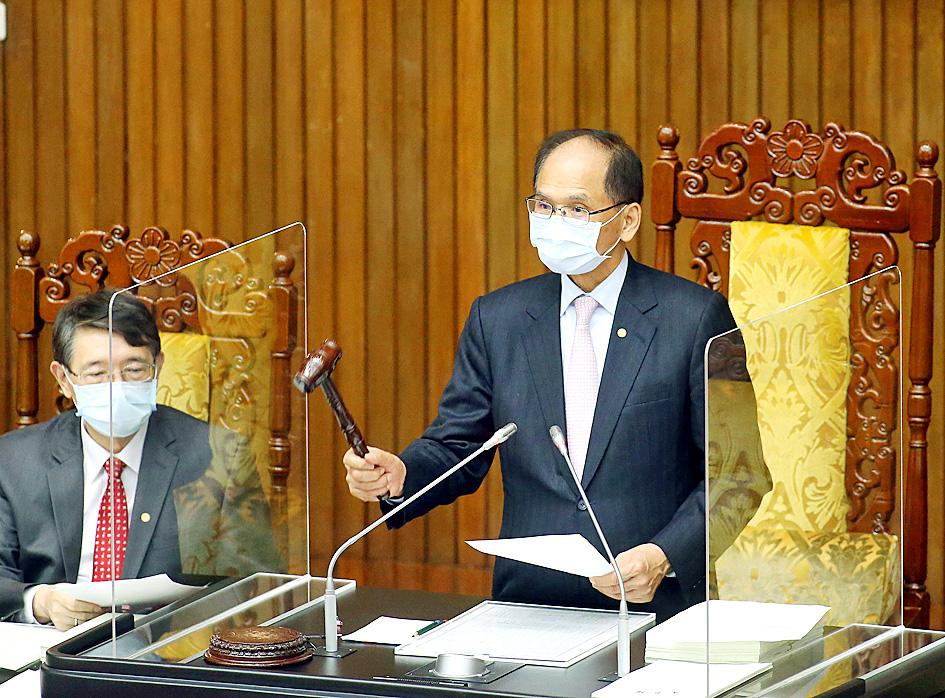The Legislative Yuan yesterday approved a proposed amendment that would double the cap on a special budget to support COVID-19 economic relief measures to NT$840 billion (US$30.37 billion).
The amendments to the Special Act for Prevention, Relief and Revitalization Measures for Severe Pneumonia with Novel Pathogens (嚴重特殊傳染性肺炎防治及紓困振興特別條例) also extended the act, which was set to expire at the end of this month, to June 30 next year.
The act was first introduced last year as COVID-19 began to spread globally, with the budget capped at NT$210 billion to ease the virus’ impact on the economy.

Photo: CNA
The budget has since received two additional increases and currently stands at NT$420 billion.
The Cabinet on May 13 sent a proposed amendment raising the budget by NT$210 billion to NT$630 billion to the Legislative Yuan for review.
The Democratic Progressive Party (DPP) legislative caucus raised the budget to NT$840 billion, given the increasing number of domestic transmissions of unknown origin.
The amended act is expected to take effect on Thursday once it is promulgated by the president. Only after that would the Cabinet make public specific budget proposals on how the money should be spent, which would then be reviewed by the Legislative Yuan.
On receiving the budget proposals from the Cabinet, the Legislative Yuan is scheduled to hold a round of cross-party meetings on Friday to discuss when to hold an extraordinary legislative session to review them, as the last session ended yesterday, DPP caucus whip Liu Shyh-fang (劉世芳) said.
According to the Executive Yuan, the funds would be used to help individuals and industries hardest hit by the outbreak and disease control restrictions. This would include loans to people in need.
One measure is a one-off payment of NT$10,000 per child to families with elementary-school age and younger children, as well as teenage students with disabilities. There is also a one-time subsidy of NT$10,000 to NT$30,000 for farmers, fishers, tour guides, taxi drivers and the self-employed, among others.
Lawmakers yesterday also passed 206 resolutions, including one ensuring that a special legislative task force, established to review government data on the purchase of COVID-19 vaccines, would continue to operate in the next legislative session.
The committee was created on May 5 in response to opposition party allegations that Taiwanese have been kept in the dark on the issue.

The CIA has a message for Chinese government officials worried about their place in Chinese President Xi Jinping’s (習近平) government: Come work with us. The agency released two Mandarin-language videos on social media on Thursday inviting disgruntled officials to contact the CIA. The recruitment videos posted on YouTube and X racked up more than 5 million views combined in their first day. The outreach comes as CIA Director John Ratcliffe has vowed to boost the agency’s use of intelligence from human sources and its focus on China, which has recently targeted US officials with its own espionage operations. The videos are “aimed at

STEADFAST FRIEND: The bills encourage increased Taiwan-US engagement and address China’s distortion of UN Resolution 2758 to isolate Taiwan internationally The Presidential Office yesterday thanked the US House of Representatives for unanimously passing two Taiwan-related bills highlighting its solid support for Taiwan’s democracy and global participation, and for deepening bilateral relations. One of the bills, the Taiwan Assurance Implementation Act, requires the US Department of State to periodically review its guidelines for engagement with Taiwan, and report to the US Congress on the guidelines and plans to lift self-imposed limitations on US-Taiwan engagement. The other bill is the Taiwan International Solidarity Act, which clarifies that UN Resolution 2758 does not address the issue of the representation of Taiwan or its people in

DEFENDING DEMOCRACY: Taiwan shares the same values as those that fought in WWII, and nations must unite to halt the expansion of a new authoritarian bloc, Lai said The government yesterday held a commemoration ceremony for Victory in Europe (V-E) Day, joining the rest of the world for the first time to mark the anniversary of the end of World War II in Europe. Taiwan honoring V-E Day signifies “our growing connections with the international community,” President William Lai (賴清德) said at a reception in Taipei on the 80th anniversary of V-E Day. One of the major lessons of World War II is that “authoritarianism and aggression lead only to slaughter, tragedy and greater inequality,” Lai said. Even more importantly, the war also taught people that “those who cherish peace cannot

US Indo-Pacific Commander Admiral Samuel Paparo on Friday expressed concern over the rate at which China is diversifying its military exercises, the Financial Times (FT) reported on Saturday. “The rates of change on the depth and breadth of their exercises is the one non-linear effect that I’ve seen in the last year that wakes me up at night or keeps me up at night,” Paparo was quoted by FT as saying while attending the annual Sedona Forum at the McCain Institute in Arizona. Paparo also expressed concern over the speed with which China was expanding its military. While the US